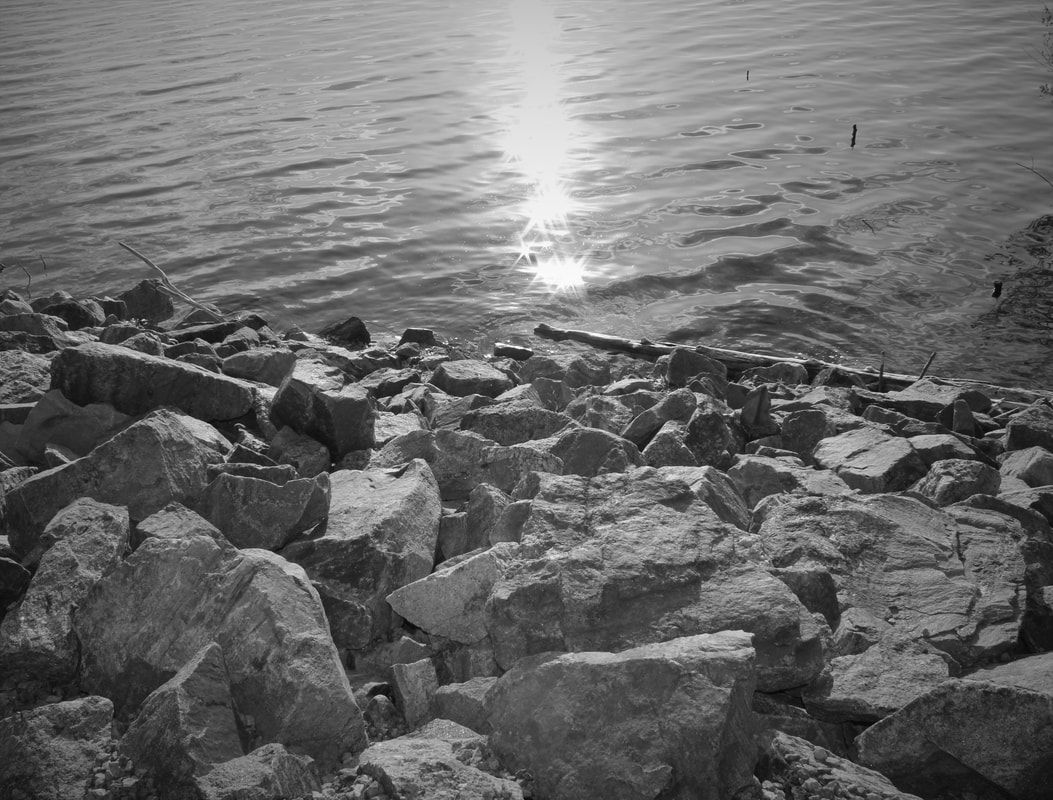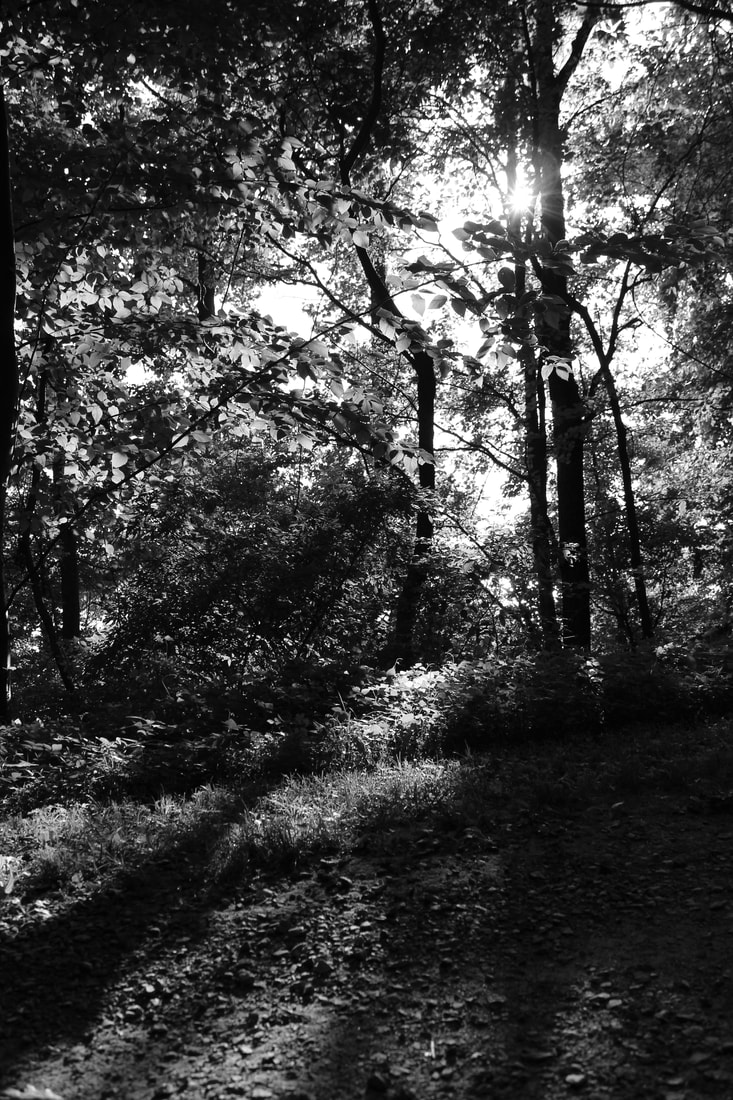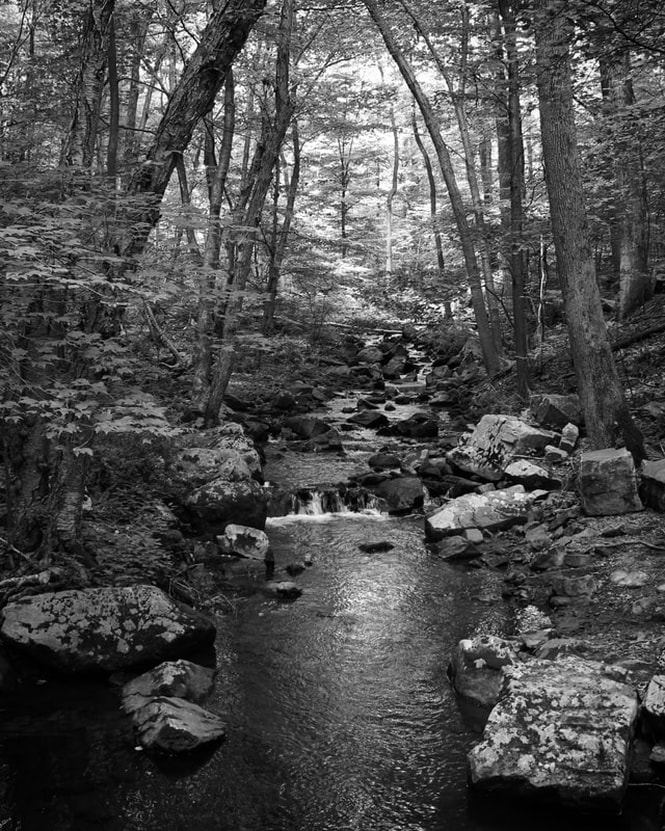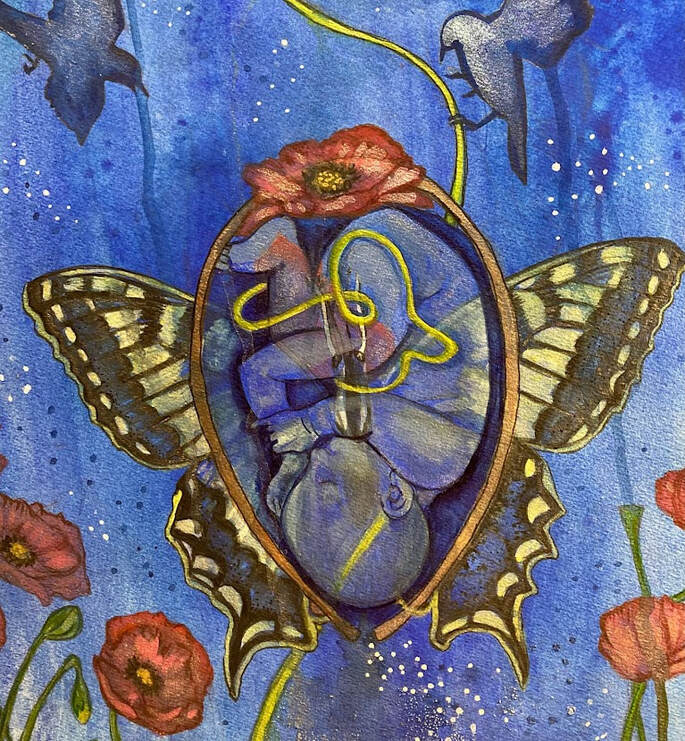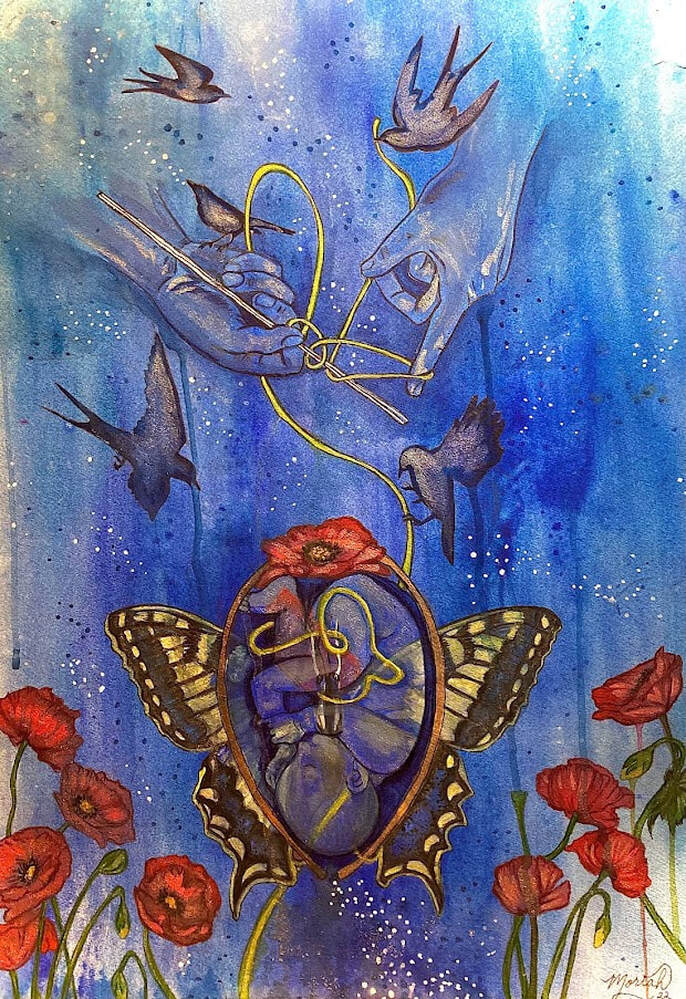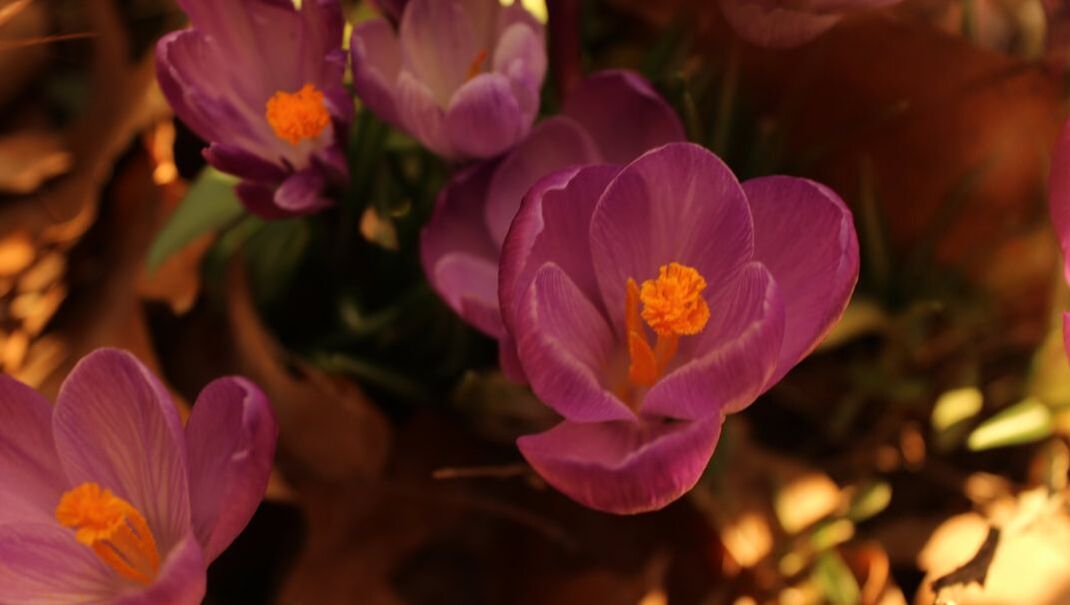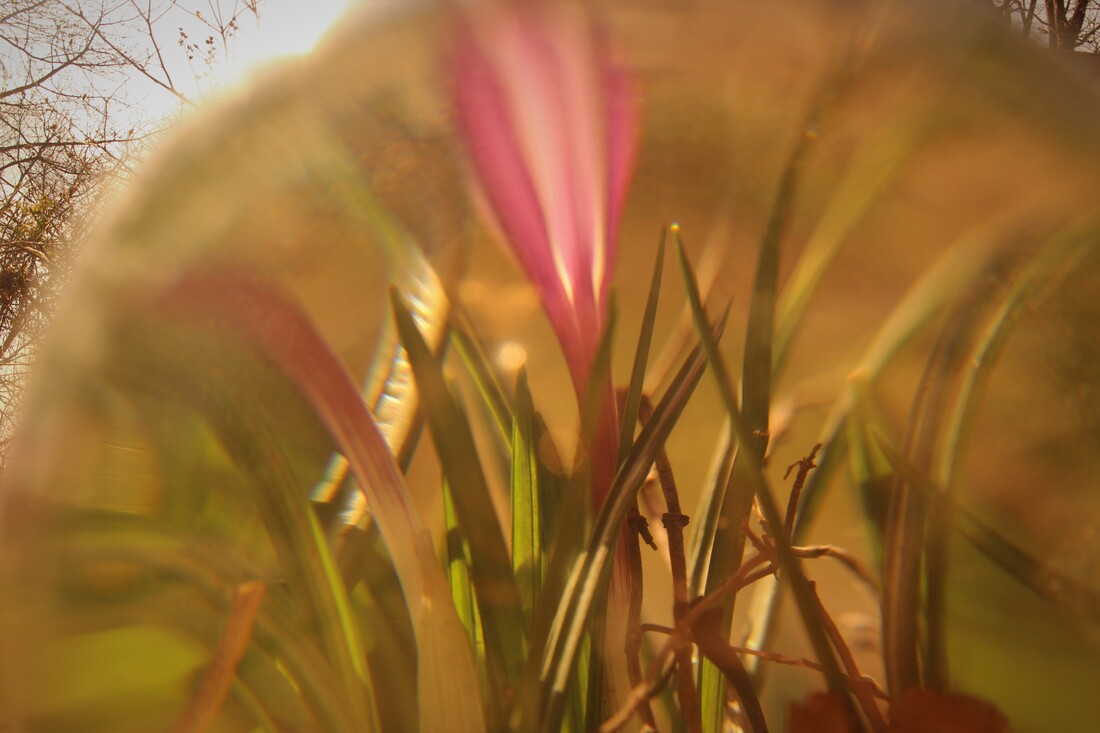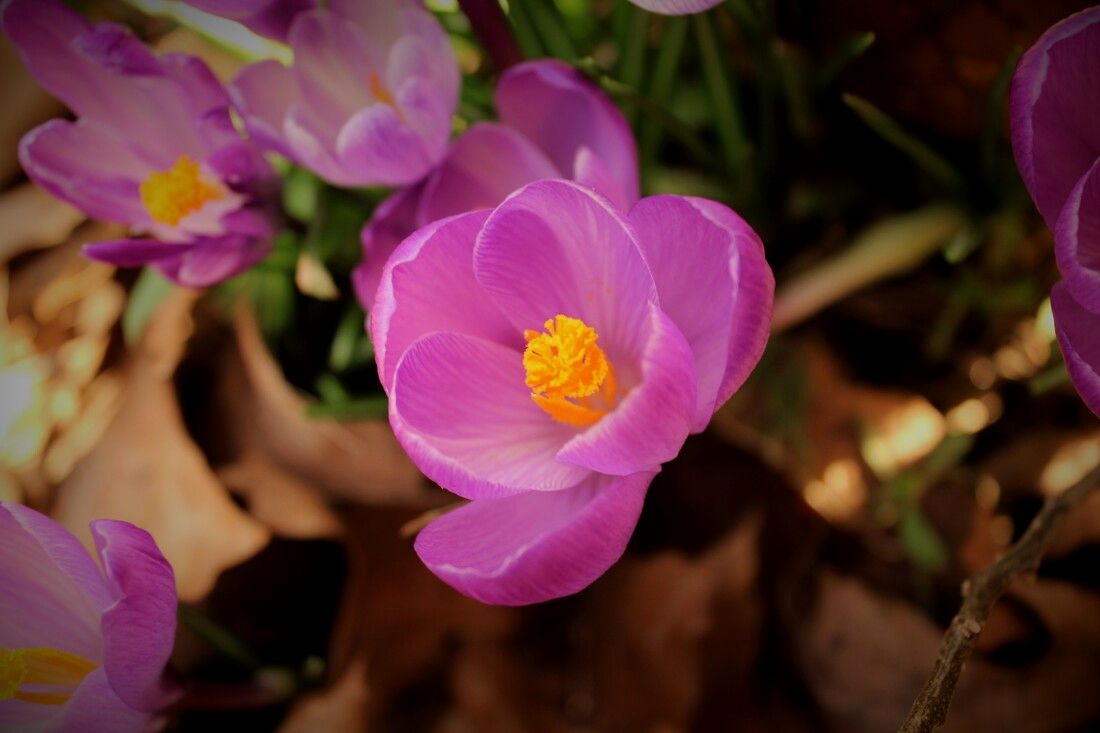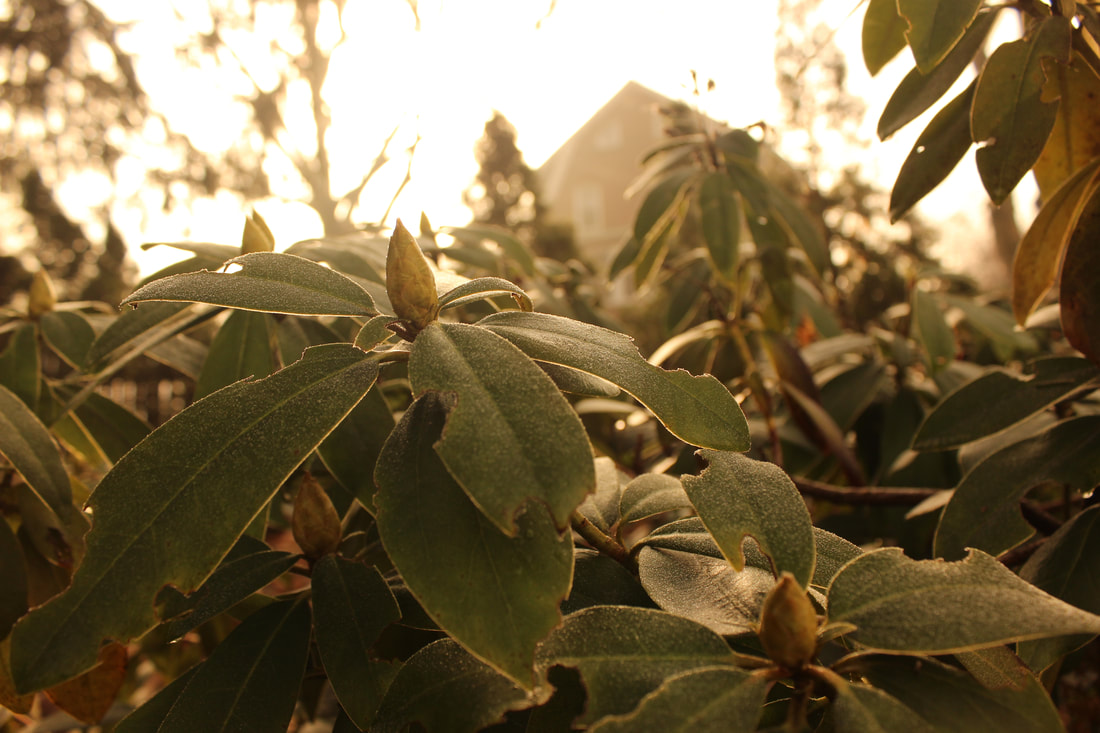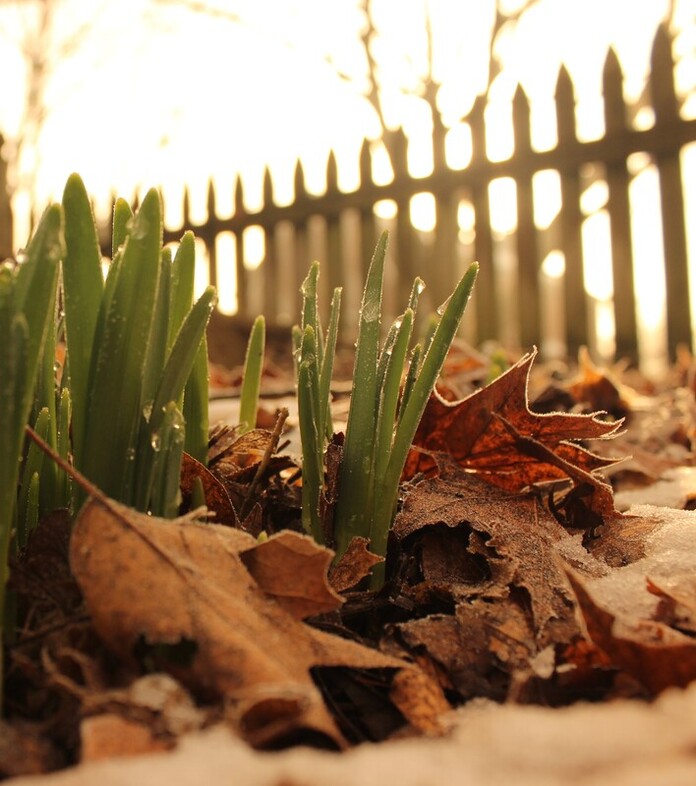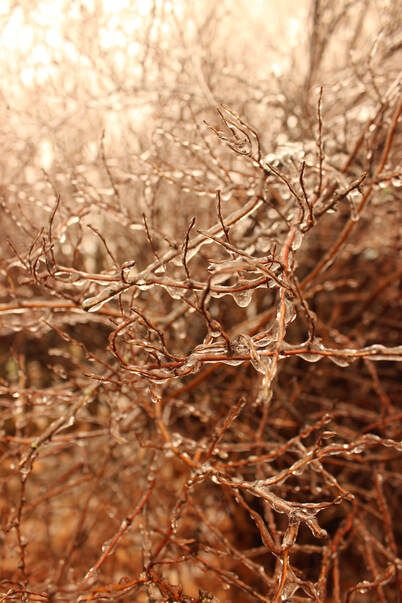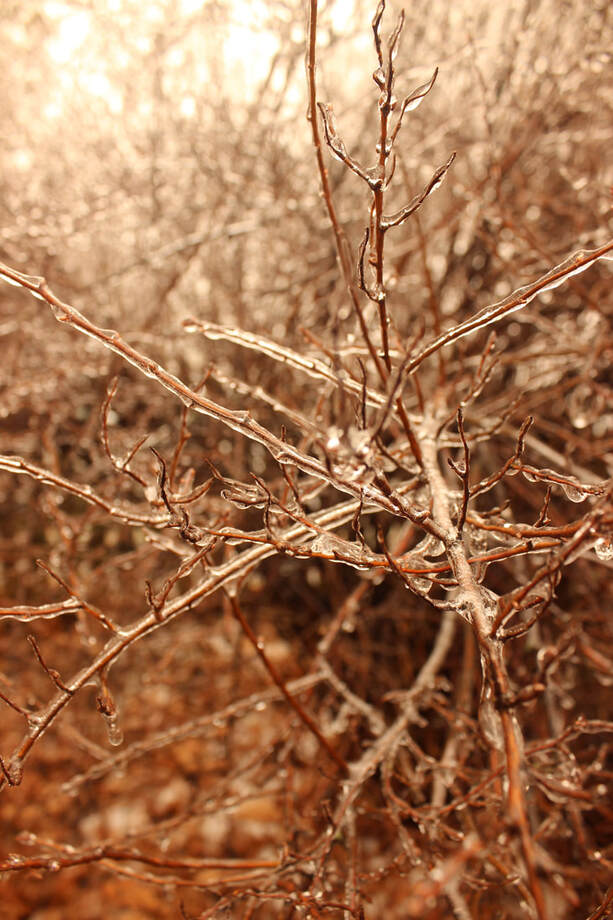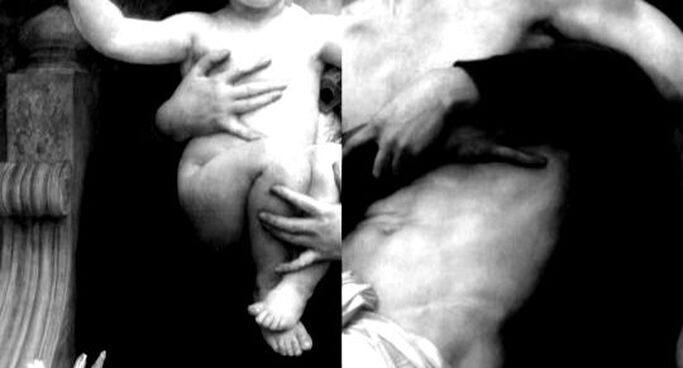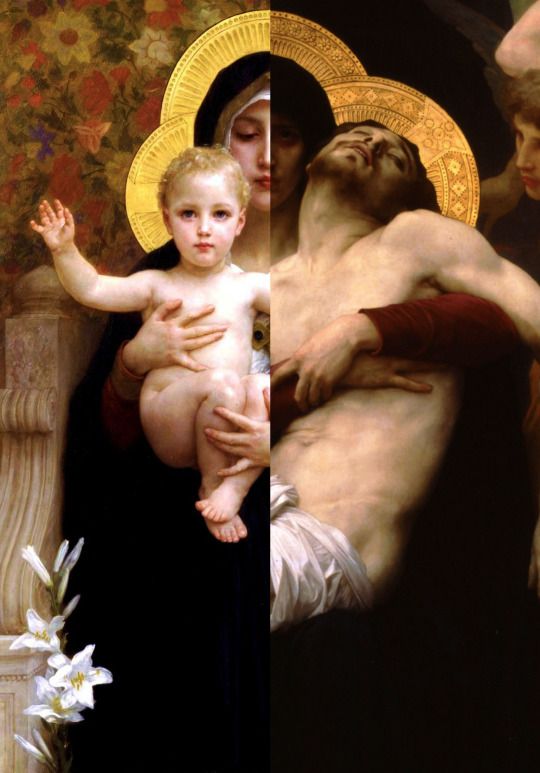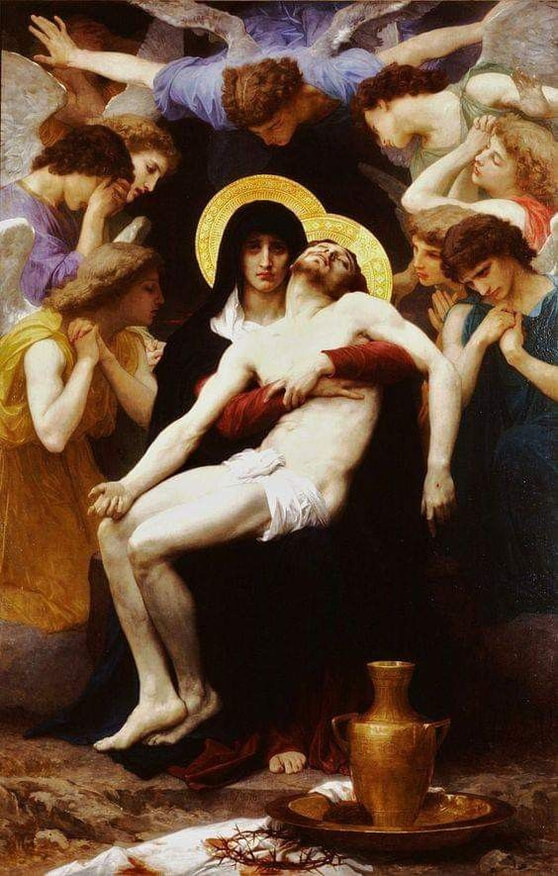|
Going to the Poets for a sense of belonging in the world, and in times of great sadness and even despair. The spirit of the time calls and draws us to bend to what sadness even grief has to say. Rainer Maria Rilke, a turn of the century, Austrian Poet & Novelist wrote about the plethora of human conditions. That neuroticism isn’t something of peculiarity, yet it is seen in a deeper way of language not spoken in ordinary conversation. Most of the time kept hidden in the tightly wrapped garments of our heart's chambers. In contrast, it seems as if it is bobbing right at the surface- unaddressed still, waiting, wanting to be ceased, to be seen, to be witnessed, to be embraced even. In the Letters to a Young Poet, a compilation of letters Rainer Rilke wrote about addressing the troubles to his dear acquainted friend by the name Mr. Kappus. Rilke writes in these letters as if a lullaby of consoling poetry to his beloved Mr. Kappus, no smoke blown, but deep in thought he wrote. It was evident Rilke felt a shared safety and vulnerability with his friend seen in a continued correspondence initiated in these 10 letters. The subject of sadness, the core notes of that lingering melancholy, and even more yet a loss of a loved one leaves us dismantled and we are all needing a friend to remind us of the silver lining we cannot quite see in moments of our darkening turbulent grief: My favorite letter of his is in Letter 8 (which I will be referencing throughout), Rilke; “But please, ask yourself whether this large sadness hasn’t rather gone right through you. Perhaps many things inside you have been transformed; perhaps somewhere, someplace deep inside your being, you have gone through important changes while you were sad. The only sadness that is dangerous and unhealthy are the ones that carry around in public in order to drown them out with the noise; like diseases that are treated superficially and foolishly, they just withdraw and after a short interval break out again all the more terribly; and gather inside of us and our unlived, rejected, lost, a life that we can die of.” -August 12, 1904, Sweden Rilke speaks of the very sobering that sadness provides us as mere mortals. The gift of sadness, the transformation that happens in the very presence of it. Rilke described sadness as an entity, a presence within. Rilke pontificates on the importance of learning how to suffer, but more importantly how to suffer well. The change happening in the pits of the lowly epitomes of sadness. That there isn’t any desperation in feeling so deeply, it is what creates full aliveness, at least a liveliness in the sense of our inner world that in turn connects us wound-to-wound. Yet Rilke warns his confidant about the distraction of going into public to drown it out as a form of avoidance to facing whatever it is that is at the soul's bones. If Rilke only knew of the many distractions we face in our modern age to escape this existential sequestering: what we lull away to when we are anxious or scared in body and mind. Really-actually just comes to bite later, or walks through the door without permission forming beneath the skin that emotion beckoning to be noticed. The inescapable emotions that flood us in our behavior, our walk, our talks…that spills out exposing the very guts of who we are. . . h u m a n. Rilke, returns to his friend with some advice at the heart of the matter, “So you mustn’t be frightened, dear Kappus if a sadness rises in front of you, larger than you have ever seen; if an anxiety, like light cloud shadows, moves over you and over everything you do, You must realize that something is happening to you, that life has not forgotten you, that it holds you in its hand and will not let you fall.” Rilke; “Why do you want to shut out of your life any uneasiness, any misery, any depression, since after all, you don’t know what work these conditions are doing inside you? Why do you want to persecute yourself with the questions of where all this is coming from and where it is going? Since you know, after all, that you are in the midst of transition and you wish for nothing so much as to change.” Change is what we are after, our natural progression of a typical striving human, to improve, to make better of. For certain change requires the depth of sadness to carve into our very character. Yes, right after the heartbreak, the disappointment of a dream dying, the tragedy in our loss of a loved one, the grace of loss of a loved one, too. Rilke suggests this is what forms us, it is transitioning us in the movements of a symphony in the silence of being the un-played instrument if we have the courage to make the sound into a song. If the trust of this strange sadness so familiar to us to strike us in the midst of our life, in the fire, in the mud, to be hardened, to be glazed, and to cracked open into a million pieces again and again, then back to the earth we all return. What was the purpose of all this? Rilke answers us with a question, 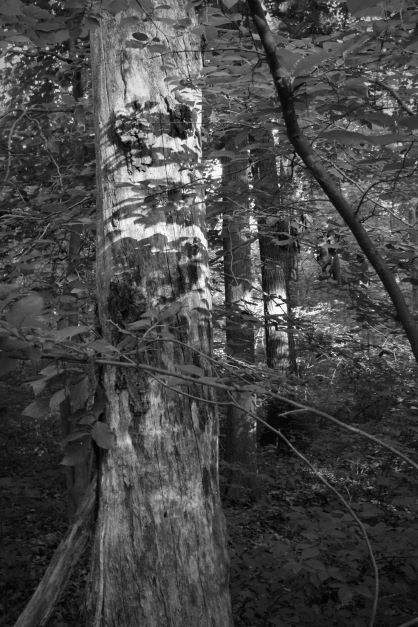 “Do you remember how that life yearned out of childhood toward the “great thing”? I see that it is now yearning forth beyond the great thing toward the greater one. That is why it does not cease to be difficult, but that is also why it will not cease to grow.” Is Rilke suggesting that something greater is at work here as we yawn, crawl out of our own way forward- to surrender to this yearning to the great beyond? Beyond the mundanity of the cerulean shades of blues-- or the things that aren’t so obvious yet are the very miracle we are gazing at every day and is it not in the flowing blood that is streaming in all of our veins? The miracle. That is you. Only one of you, all of you, in all of the time. Then, there is the grey shade of feeling and experiences asking to be brought to light, not to be turned up of its mysteries, but how we can see through it with help of a passing stranger (like Mr. Kappus), a friend, a lover, and something greater- is it ourselves? Or is there more? One could say that Mr. Kappus was a very lucky friend indeed receiving the kind tenderness from a finely worded friend like Rilke. We all need the familiar encouraging voice of 'nother when we are trying to weather the storms and season of our circumstance, we are so well at masking in our faux austerity. Rilke,
“Don’t think that the person trying to comfort you now lives untroubled among the simple and quiet words that sometimes give you pleasure. His life has much trouble and sadness and remains far behind yours. If otherwise, he would have never been able to find those words.” Yes, Rilke indeed, it certainly takes a person to meet you at the 'deep calling unto deep' (psalm 42:7) that there is no beauty, truth, and goodness in concealing ourselves. That is where we have come from in the mire and is now wholly connected in our compassion to brokenness since after all we are all inescapably born into. The quiet words that are written are understood as ancient as we. Thank you for reading. Peace, Moriah
0 Comments
A swallows flock a-soaring
up above, The golden twine, Unwinds From Father’s hands Knitted carefully, accounted for, And formed In the ocean’s womb Oh, Mother blue, Among the poppy blossoms Spotted merrily about On those crimson groves Of sweet honey filled notes Perched Upon that opened wing… A grain of hope Is where I still dream of you… • • • WHERE I STILL DREAM OF YOU watercolors, metallic, acrylic + ink on cold press paper, 15.5 x 22.5 Original art + poetry (2022) 'Nature is mortal; we shall out live her. When all the suns and the nebulae have passed away each one of you will still be alive. Nature is only the image, the symbol . . . We are summoned to pass in through Nature, beyond her, into the splendor which she fitfully reflects. And in there, is beyond Nature, we shall eat of the tree of life. We do not want merely to see beauty, though God knows, even that is bounty enough. We want something else that can hardly be put into words -- to be united with the beauty we see, to pass into it, to receive it into ourselves, to bathe into it, to become part of it. . . . That is why the poets tell us such lovely falsehoods. They talk as if the west wind could really sweep into a human soul; bit it can't . . . Or not yet. Meanwhile the cross comes before the crown and tomorrow is Monday morning. A cleft has opened in the pitiless walls of the world, and we are invited to follow the great Captain inside.' -C.S. Lewis, The Weight of Glory “Is it that the message of nightmares and dreams? To live either fully alive…or in empty nothingness? It is the in between that drives us mad, It is the life in between the walking lifeless, the years of calloused and simply going through the hollow motions, the self-protecting by self-distracting, the body never waking, that’s lost all capacity to fully feel- this is the life in between that makes us the wild walking dead.
How do we live fully so we are fully ready to die?" -Ann Voskamp, One Thousand Gifts 'It is not the physical object, it was but that indescribable something of which they become for a moment the messengers. It seldom seems the message was intended for us, but something we overheard. Beauty has smiled, but not to welcome us; her face turned in our direction but not to see us. For they are not the *thing* itself; they are only the scented flower we have not found, the echo of a tune we have not heard, news from a country we have never yet visited. The books or the music in which we thought the beauty was located will betray us if we trust to them; it was not *in* them, it is only what came *through* them, and what came through them was longing…' -C.S. Lewis, The Weight of Glory
Resonating words from a new read and some of my Icy Orchard photography on dslr from this past weekend, spring is inevitably coming… May peace be with you and with us all. 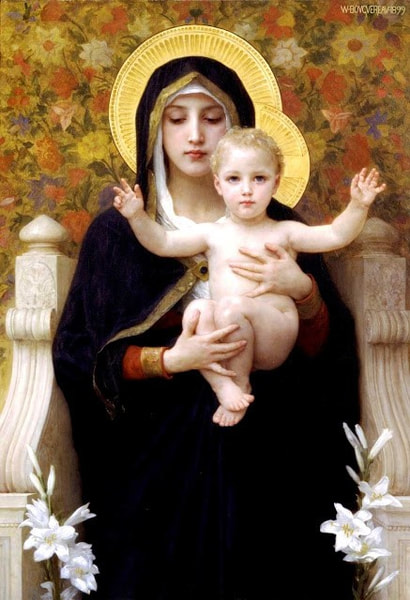 The Madonna of the Lilies painted in 1899 by William Adolphe Bouguereau (1825-1905). The Madonna of the Lilies painted in 1899 by William Adolphe Bouguereau (1825-1905). "Just as the savage puzzles in bewilderment over - some strange piece of jetsam is it? some long buried relic of the sands? or some mysterious object fallen from the sky (enigmatically serpentine, glinting now dully and now with a piercing shaft of light), turning it this way and that, fumbling with it in an attempt to find a use for it, to apply it to some practicable lowly function oblivious of any higher one, so do we, holding art in our hands, confidently deem ourselves its masters and boldly set out to direct it, to renew, reform and parade it, to sell it for money or flatter the strong with it, or turn it into entertainment, into popular songs and night club acts, or into a stopgap or a stick, depending on our whim, for transitory political or limited social needs. But art is not sullied by our efforts and thereby loses nothing of its pedigree, always and in all functions bestowing upon us a portion of its mysterious inner light. But can we encompass the whole of that light? Who would dare say that he had defined art, that he had enumerated all its aspects? Perhaps someone has already understood and named them for us in centuries past, but we were unable to linger for long: we listened a moment, then turned a deaf ear and tossed it aside, thirsting as always to change what we had, however perfect, for no matter what, so long as it was new. And when they tell us the old truths again, we do not even remember that we already possessed them. One artist fancies himself the creator of an independent spiritual world and shoulders the act of creating that world, populating it and taking total responsibility for it, but his knees buckle under the strain, for mortal genius is not capable of sustaining such a load - just as man in general, having proclaimed himself to be the centre of creation, has proved incapable of creating a balanced spiritual system. And when failure overtakes him, he shrugs off the blame on the primordial disharmony of the world, the complexity of the modern disorientated soul or the du11-wittedness of the public. Another acknowledges a superior power over him and cheerfully works as an insignificant apprentice under God's heaven, although he recognises an even heavier responsibility for everything that he writes or paints and for the souls coming under his influence. At the same time it was not he who created this world or controls it, and so he never doubts its foundations; all that is given to the artist is to have a keener sense than others of the world's harmony and of the beauty and ugliness of man's contribution to it, and to convey this vividly to others. Even in failure and even on the lowest rungs of existence- in destitution, in prison, in infirmities- he will never be forsaken by this sense of stable harmony. The whole irrationality of art, however, with its dazzling convolutions, its unpredictable discoveries and its stunning power to move people - all these are too mysterious to be accounted for by the artist's beliefs and intentions or the work of his unworthy hands. Archaeologists have yet to discover a stage of human existence when we were without art. Back in the primeval dawn of humanity we received it from hands that were too indistinct for us to see. And there was no time to ask: what is this gift for, what shall we dowith it? And all those false prophets were wrong and will always be wrong when they forecast that art will disintegrate, that it will outlive its forms and die. It is we who will die, art will remain. And are we capable of grasping all its aspects and all its functions before we die Not everything can be named. There are some things that go beyond words. Art can kindle even the shrammed and benighted soul to exalted spiritual experience. Art is the means by which we are sometimes vouchsafed- dimly and briefly- such revelations as are not accessible to rational thought. Like that little mirror in the fairy tales. You look into it and you glimpse- not yourself: you glimpse for an instant the Inaccessible, whither you can never gallop or fly. And only a deep yearning remains." -October 1970 Alexander Solzhenitsyn was awarded the Nobel Prize for literature. This award was not welcomed by the Soviet government, however, and Solzhenitsyn declined to attend the prize-giving ceremony in December 1970 for fear of not being allowed to return to the Soviet Union. R.I.P. #alexandersolzhenitsy |
AuthorMoriah Mylod Archives
July 2022
|
